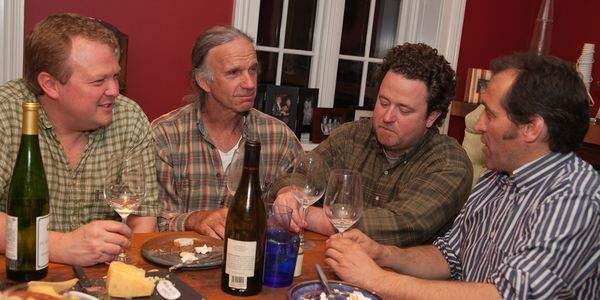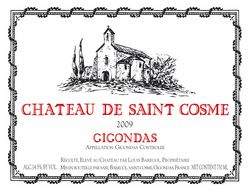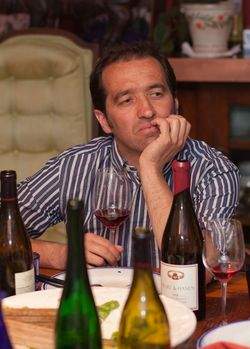 By Evan Dawson, Managing Editor
By Evan Dawson, Managing Editor
Photo from left to right: Justin Boyette, Phil Davis, Rick Rainey, Louis Barruol
Louis Barruol, vigneron of the critically acclaimed Chateau de Saint Cosme winery in France's Rhone Valley, has agreed to a partnership to make wine under a new Finger Lakes label. Chateau de Saint Cosme is located in Gigondas and is widely considered the top producer in that appellation, while also producing wine from various other Rhone appellations, including Chateauneuf-du-Pape.
Barruol will be an equal partner alongside Rick Rainey in the new Forge Cellars project. Justin Boyette, winemaker for the Hector Wine Company, is also involved and will help make the wines at the Hectcor Wine Company facility. Phil Davis, of Damiani Wine Cellars, is on board as well, offering to help the team secure quality fruit. 
The first vintage of Forge Cellars will be 2011, with a small initial production of only riesling and pinot noir. Barruol expects to make roughly 300 cases of each this year, with an eye toward gradually increasing production in coming years.
"The Finger Lakes is better than anything I saw anywhere else," Barruol said this week during his third visit to the region. "This is the place I like most."
The tentative plan is for Barruol to visit the Finger Lakes several times each year, with at least one visit during harvest. His winemaking decisions will not be unilateral; Boyette will contribute and handle much of the execution, with Rainey and Davis offering input on growing and other areas.
"The bar is going to be extremely high," Rainey said. "We know that. We've been working for a long time to launch this project and we're finally ready." But he added, "The last thing we want anyone to think is that Louis Barruol is coming to the Finger Lakes to show everyone how it's done. We're going to learn from the other great winemakers in this region, and we're going to try some new things. We've met privately with other winemakers already and we've heard nothing but positive feedback."
A conversation with Barruol reveals that the Frenchman will indeed seek to try new approaches.
 Louis Barruol: Opinionated but humble
Louis Barruol: Opinionated but humble
"I am not here to tell anyone anything," Barruol said as we tasted through his impressive lineup of Gigondas cuvees.
They are the kind of red wines that offer a glimpse of what the Finger Lakes might aspire to on a slightly smaller scale: Depth, but freshness, and "no fat!" as Louis says. "The Finger Lakes was already doing great things before I came here," he continued.
I asked if he had been impressed by any Finger Lakes wines or winemakers in particular. He singled out a bottle of Red Newt 2006 Reserve Riesling and also praised the pinot from Heart & Hands. Then he said, "Morten at Ravines and Fred at Wiemer. They are outstanding. To me, the Finger Lakes can easily compete with the greatest German rieslings. Easily. The best Wiemer is not much different than the best German wines. Quality is already here. We can find it."
But Barruol plans to do things that few others are doing in the region. It starts with his plan to use old barrels for riesling. "I have made a lot of white wine in stainless steel and a lot of white wine in wood," he said. "I think stainless steel is the worst for making wine. In old wood, the wine stays very, very fresh. You would not be able to tell it's aged in wood. It's just a bit rounder, but there is no oak influence whatsoever in the wine."
Customers can expect dry riesling with a big frame from Forge Cellars.
"Our grapes will be ripe, but our wines will be dry," Barruol said. "Sugar is a problem for me, usually. We don't want much sugar."
Then there are his plans for pinot noir. Barruol loves Burgundy, and when his Gigondas cuvees age, he finds they take on a more Burgundian quality. The Finger Lakes will give him his first chance to make pinot noir.
"Sleepy potential"
"The immediate potential for riesling is great," Barruol said. "The sleepy potential for pinot is also great, but there is a long ways to go with it."
He finds the Finger Lakes climate to be superior to most others in the world for pinot noir. "Pinot doesn't like sun. Pinot likes clouds. Pinot gets burned easily. If the Finger Lakes had milder winters, it would be the ideal climate, perfect."
Barruol explained his biggest concern about making complex, quality Finger Lakes pinot noir. He is opposed to the use of clones, and favors the old-world method of planting "selection massale," detailed in this link.
"You can not gain the same complexity with clones," Barruol said. "The vines are all the same, and the wines are safe, more simple." He explained that in Gigondas, for example, "it is all different. You have different plants, not clones, and it is so much better for the wines. But at some point, scientists convinced everyone that clones were healthier. I don't even think that's true."
Barruol will purchase fruit in the Finger Lakes made from clones because, for now, there is no other option. "That will take many years to change," Phil Davis said. "But he makes good points. I'm very open to new plantings and new ideas. We're all here to explore. Wine is not all science; it's art."
Forge Cellars: All about quality
"We are pouring everything into quality," Rainey said. "That's the advantage of a small production. We want to see how high quality can go. The first few years will be largely experimental, with a lot of variables, but we know there will be high expectations. We welcome that."
"Sometimes you're lucky and you find a good recipe immediately," Barruol said. "But sometimes it takes a few years. We'll see."
Forge Cellars wines will be sold in the Hector Wine Company tasting room and eventually a few local stores and restaurants.
"I just think about the last few years, and the fact that Louis could have chosen to start a new project anywhere in the world," Rainey said. "He chose the Finger Lakes. I think that says all you need to know about how good Finger Lakes wines are, and how good they can be."
